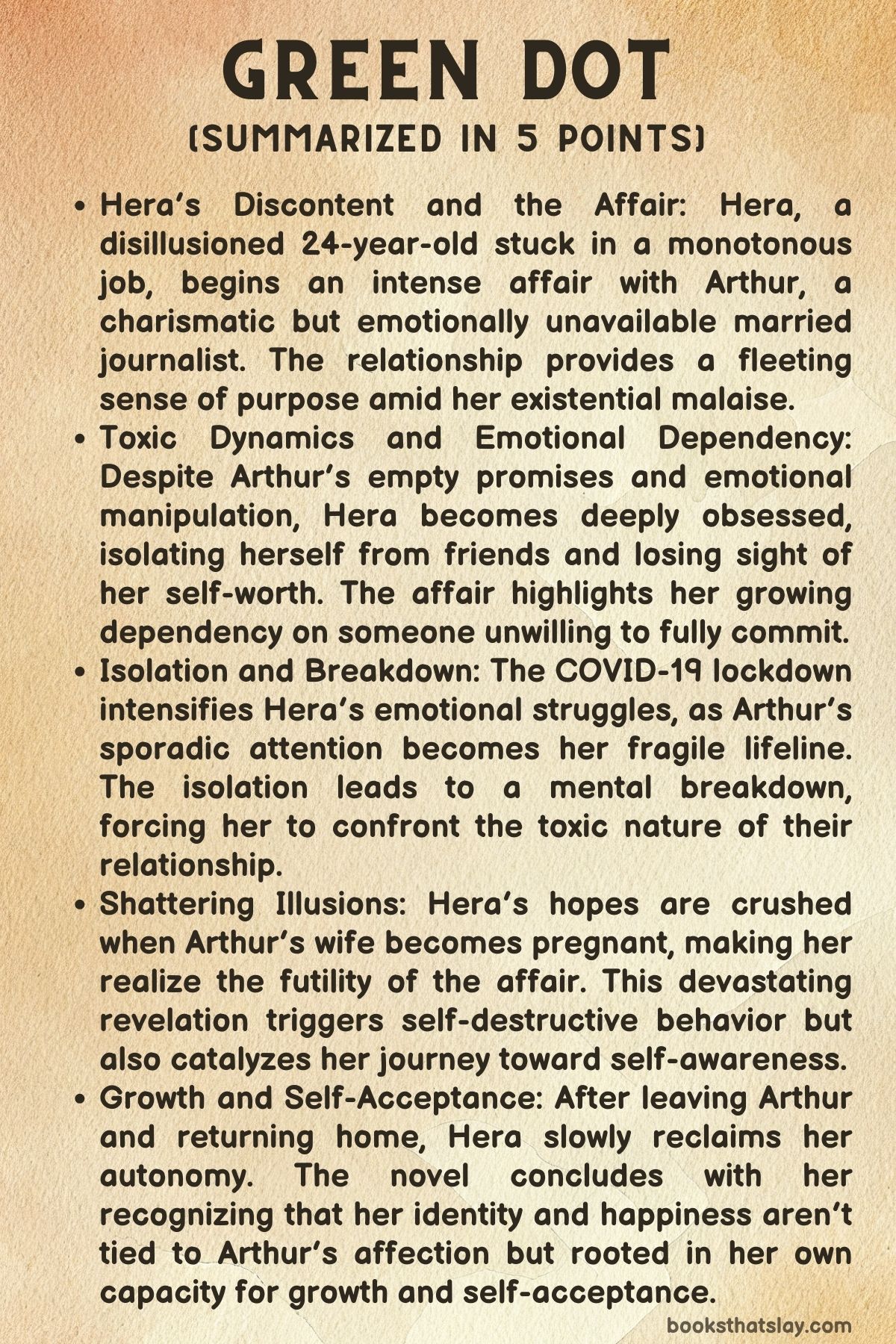Green Dot by Madeleine Gray Summary, Characters and Themes
Green Dot by Madeleine Gray is a sharp, darkly funny exploration of modern relationships, identity, and the messy contradictions of early adulthood.
Centered around Hera, a twenty-something stuck in the limbo of unmet potential and existential malaise, the novel traces her descent into an all-consuming affair with Arthur, a charismatic but emotionally unavailable married journalist. Through Hera’s raw, self-aware narration, Green Dot unpacks the intoxicating thrill of desire, the quiet devastation of unrequited love, and the painful process of self-discovery in a world where connection feels both essential and elusive.
Summary
Hera, a disaffected 24-year-old adrift in the haze of post-university life, is stuck in a monotonous routine.
Sharp-witted but emotionally stagnant, she works a mind-numbing job moderating the comments section of an online news outlet—a role that amplifies her cynicism about the world and herself.
Hera is deeply self-aware, her days filled with existential musings and a growing sense of disillusionment about adulthood. Her relationships are shallow, her ambitions undefined, and her sense of self tethered to fleeting distractions.
Enter Arthur, a middle-aged British journalist at her workplace, whose charm and intellectual gravitas immediately captivate Hera.
Despite having primarily dated women in recent years, Hera finds herself irresistibly drawn to Arthur. Their flirtatious banter quickly escalates into an affair, igniting something within Hera she hadn’t realized was dormant—a desperate longing to be desired, seen, and understood.
The relationship is thrilling in its secrecy, intoxicating in its forbidden nature, and yet, from the outset, tinged with the inevitable bitterness of its limitations. Arthur is married, and his wife remains an invisible but ever-present figure looming over their liaison.
At first, Hera convinces herself that what they share is unique, profound, even transformative.
The clandestine nature of their meetings—stolen moments in Arthur’s apartment, cryptic messages punctuated by green dots of online activity—adds a layer of excitement that masks the darker truths of their dynamic. Hera romanticizes Arthur’s attention, interpreting his affection as validation of her worth. But beneath the surface, cracks begin to form.
Arthur’s vague promises of leaving his wife remain unfulfilled, his life neatly compartmentalized in a way that allows him to enjoy both the comfort of his marriage and the thrill of the affair without real sacrifice.
As the affair progresses, Hera’s emotional dependence on Arthur deepens, leaving her increasingly isolated from her friends, Soph and Sarah, who watch her unravel with growing concern.
Soph, pragmatic and career-driven, offers logical advice that Hera resents but can’t dismiss. Sarah, more emotionally attuned, confronts Hera with uncomfortable truths about her choices.
Their friendships become strained as Hera’s obsession with Arthur consumes her, creating a chasm between the life she’s living and the one she desperately wants.
The arrival of the COVID-19 pandemic exacerbates Hera’s isolation. Lockdowns limit her already restricted world, making Arthur’s sporadic attention her primary lifeline. Hera’s mental health deteriorates as she grapples with the emotional whiplash of Arthur’s mixed signals—affectionate one moment, distant the next.
The relationship’s toxicity becomes undeniable, but Hera clings to the hope that he will eventually choose her.
The tipping point comes when Arthur’s wife becomes pregnant. This news shatters the fragile fantasy Hera has built, forcing her to confront the reality she’s long avoided: Arthur will never leave his wife.
The revelation plunges Hera into a spiral of grief, self-loathing, and disillusionment.
She attempts to fill the void through meaningless encounters on dating apps, but these fleeting connections only underscore her emotional emptiness.
Eventually, Hera reaches a breaking point. Emotionally exhausted and mentally frayed, she suffers a breakdown that propels her to leave the city and return to her father’s home.
Her relationship with her father is distant yet grounding, offering a stark contrast to the tumult of her affair. In the quiet of her childhood home, Hera begins to process her experiences—not with dramatic revelations, but through small, incremental shifts in perspective.
In a final meeting with Arthur, Hera realizes she no longer craves his validation. The once-overpowering feelings have dulled, replaced by a clear-eyed recognition of his emotional cowardice and her own complicity in the affair’s toxicity.
This moment isn’t triumphant in the traditional sense, but it marks a quiet reclamation of her autonomy.
Green Dot concludes not with neat resolutions but with Hera standing on the precipice of something new—an undefined future that no longer terrifies her. She understands now that her identity isn’t shaped by who desires her, but by her own capacity for growth, resilience, and self-acceptance.
The novel leaves readers with a poignant reminder: sometimes the most significant love story we experience is the one we have with ourselves.

Characters
Hera
Hera is a complex character who embodies the struggles of modern adulthood and the search for personal identity. At twenty-four, she is grappling with feelings of stagnation and a lack of direction in her life.
Initially, she appears to be a young woman who has yet to reach her full potential, consumed by a sense of malaise and emotional apathy. Her affair with Arthur, a middle-aged married man, becomes the catalyst for her emotional journey, offering her a temporary escape from her inner turmoil.
The affair fills a void in her life, providing her with excitement, attention, and a sense of worth, but it also introduces a deeper conflict as she realizes the unhealthy dependency she is developing on Arthur’s validation. As the story unfolds, Hera’s emotional highs and lows reflect the toxic nature of their relationship.
The pandemic exacerbates her isolation and emotional breakdown, pushing her into a state of reflection. Ultimately, Hera undergoes a journey of self-discovery, learning to reclaim her autonomy and realize that her happiness and self-worth cannot be tethered to a relationship that is fundamentally flawed.
By the end, she embraces her solitude and begins the difficult process of moving forward without relying on Arthur’s affection.
Arthur
Arthur is a key figure in Hera’s emotional turmoil, acting as both a source of desire and frustration. As a middle-aged journalist, Arthur is charming and intellectually stimulating, traits that initially draw Hera to him.
However, beneath his allure lies a manipulative and emotionally selfish side. Arthur enjoys the thrill of his affair with Hera but shows no intention of leaving his wife or committing fully to her.
He keeps Hera emotionally tethered through vague promises and a sense of future potential that never materializes. His actions demonstrate a lack of courage and an inability to face the consequences of his choices.
Arthur thrives on attention and control, balancing his family life with the secret affair while indulging in his desires without considering the emotional cost to Hera. As the affair progresses, his promises become increasingly empty, and Hera is forced to confront the painful truth about his nature—he is unwilling to sacrifice his comfort for a true connection.
Arthur’s character arc is defined by his duplicity and self-centeredness, ultimately revealing him to be a man who prioritizes his own desires over the emotional well-being of those around him.
Soph and Sarah
Soph and Sarah serve as crucial emotional anchors in Hera’s life, each offering a different form of support, yet both ultimately pushed aside as Hera becomes increasingly consumed by her affair with Arthur. Soph is the more rational and career-driven of the two, offering practical advice and a grounding perspective on Hera’s chaotic emotional state.
Soph provides a stabilizing influence but struggles to connect with Hera on an emotional level, often feeling frustrated by Hera’s inability to break free from the toxic relationship. On the other hand, Sarah is more in tune with her emotions and tries to offer Hera more candid, honest insights into her behavior.
While Sarah’s concern for Hera remains genuine, their friendship begins to deteriorate as Hera isolates herself in her obsession with Arthur. Despite this, both friends reflect the theme of female relationships as sources of strength and resilience, even though Hera’s fixation with Arthur leads her to neglect their support.
Hera’s Father
Hera’s relationship with her father is distant yet significant, providing a contrast to the chaos and emotional confusion in her romantic life. While their interactions are not marked by deep emotional expression, Hera’s father represents a form of unconditional love that is stable and dependable.
He offers Hera a semblance of comfort when her life unravels, especially during the aftermath of her affair with Arthur. Despite their distance, his role in her life highlights the importance of family as a grounding force, even if Hera does not fully appreciate it in the moment.
Hera’s return to her father’s home after a breakdown signifies her attempt to reconnect with this stable, more straightforward form of love. Her father’s role underscores the theme of independence and self-reliance as Hera seeks solace and healing in a more predictable and steady environment.
In many ways, Hera’s father serves as a reminder that real, unconditional love exists outside the tumultuous realm of romantic relationships.
Themes
The Toxic Nature of Unfulfilled Desire and Emotional Dependency
One of the central themes of Green Dot is the way unreciprocated or unfulfilled desire shapes an individual’s emotional landscape. Hera’s affair with Arthur becomes a lens through which we observe the depth of emotional dependency.
Initially, their passionate encounters provide Hera with a sense of worth and excitement that is otherwise missing from her life. However, as time passes, the glaring disparity between her hopes and Arthur’s actions becomes painfully evident.
The relationship is built on promises that are never realized, and this disparity between what she desires and what she receives from Arthur leads her to a perpetual state of yearning. Hera’s increasing obsession with the idea of a future with Arthur, despite his failure to fully commit or leave his wife, illustrates how people can trap themselves in the pursuit of something that is always just out of reach.
This theme explores the human tendency to romanticize unavailable love and how such longing can foster a sense of powerlessness, eroding the emotional well-being of the individual caught in it.
The Destructive Consequences of Emotional Isolation in the Context of Modern Society
Green Dot delves into the destructive impact of isolation, particularly in the context of contemporary societal pressures. Hera’s journey is significantly marked by her growing sense of emotional and social disconnection.
When the pandemic lockdown hits, her emotional fragility worsens, and her isolation becomes even more pronounced. The lockdown serves as both a literal and metaphorical trap for Hera, who, already disconnected from meaningful social bonds, becomes entirely dependent on Arthur’s sporadic attention.
The loneliness of her existence exacerbates her sense of helplessness, highlighting how modern life—particularly in large cities or during times of social distancing—can exacerbate feelings of alienation. Hera’s attempts to replace Arthur’s affection through casual relationships or dating apps reveal the hollowness of these fleeting connections.
The theme emphasizes the difficulty of forging real human bonds in a world that often prioritizes superficial engagements, leading to an emotional void that proves incredibly hard to fill.
The Illusion of Control in Relationships and the Deceptive Nature of Emotional Manipulation
Another significant theme in Green Dot is the illusion of control in relationships and the ways in which emotional manipulation distorts perceptions of power and affection. Arthur, despite his outward charm, operates in a manipulative way, enjoying the attention and validation Hera offers while maintaining his existing family life.
He presents himself as a man torn between two worlds, offering empty promises to Hera, which she interprets as signs of his love and commitment. The deceptive nature of Arthur’s behavior becomes clear as his promises to leave his wife remain unfulfilled, leaving Hera in a perpetual state of uncertainty.
The theme explores the extent to which individuals can be drawn into relationships where one party wields control, often unknowingly, while the other believes they are in a position to change the status quo. Through Hera’s experiences, the novel critiques the self-deception that occurs when someone becomes emotionally invested in a manipulative situation, believing they can change it or find fulfillment where none exists.
The Complexities of Self-Discovery and Personal Growth in the Face of Emotional Adversity
Hera’s journey is one of painful self-discovery and growth, making it another pivotal theme of Green Dot. At the beginning of the novel, Hera is adrift, disconnected from her sense of purpose and plagued by a deep sense of unfulfilled potential.
The affair with Arthur initially provides her with an escape from her monotonous life, but as the relationship deepens, she faces the crushing realization that it is an emotionally unsustainable path. It is through this painful experience that Hera begins to confront the deeper questions of who she is and what she truly wants from life.
The emotional devastation triggered by Arthur’s betrayal, particularly when he announces his wife’s pregnancy, becomes the catalyst for Hera’s self-reflection. The breakdown that follows leads Hera to reevaluate her values, recognize her need for independence, and ultimately reclaim her sense of autonomy.
This theme explores the often messy, difficult process of growing into oneself, shedding illusions, and learning to embrace the complexity of personal growth, even when it involves confronting painful truths.
The Erosion of Female Friendship and Solidarity in the Shadow of Toxic Relationships
The novel also delves into the strain that toxic romantic relationships can place on female friendships. Hera’s relationship with Arthur isolates her from her friends, particularly Soph and Sarah, who, despite their contrasting personalities, both serve as grounding forces in Hera’s life.
Soph, with her rationality and career-driven mindset, offers practical advice, while Sarah’s emotional intuition challenges Hera’s choices and encourages her to examine her actions more critically. However, as Hera becomes more consumed by her affair, her connection to both women deteriorates, revealing how toxic relationships can cause rifts in even the strongest of friendships.
The theme emphasizes how, in a desperate search for emotional fulfillment, individuals often push away those who care for them the most. It also highlights the importance of female solidarity and the necessity of recognizing unhealthy patterns in relationships before they erode meaningful connections with others.
Despite this, the novel subtly suggests that these friendships, though tested, ultimately remain a vital source of resilience for Hera, even as she takes the difficult step of walking away from her toxic attachment to Arthur.


